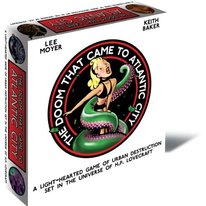 In May 2012, there was a Kickstarter for a board game, The Doom That Came to Atlantic City. It seemed inevitable it would get funded: a Monopoly satire and upgrade with heavy Lovecraftian elements and stunningly sculpted models of the elder gods, created by game vets Lee Moyer and Keith Baker, awesome miniatures designed by Paul Komoda. And it was a slam dunk; it's goal was $35,000 and the Kickstarter earned $122,000. The backers (myself included) cheered and awaited their game as the new publisher that started the Kickstarter, Forking Path, took our money and got to work. Unfortunately, Forking Path's game never materialized.  At first, there were updates on the Kickstarter page. Over time, the updates became fewer and fewer. The updates were still encouraging; Erik Chevalier, the founder and sole employee of Forking Path (but not one of the creators of the game), talked how the project was moving along, the talks with printers, and various mentions of manufacturing in China. Even on June 2, 2013, a little more than a month before the inevitable end, the project was mentioned as "moving along". And then there was the July 23rd update. Chevalier said the project was over, the game cancelled. He blamed his own inexperience. He indicated he would write a post mortem soon, one that as of this day has never appeared. Strangely, he indicated that the Kickstarter was actually to launch a new company with Doom That Came to Atlantic City as its initial game, a claim that was never stated anywhere in the Kickstarter details. He listed such things as forming the company, his own move from Portland, and other things unrelated to games as where the money went to. Ultimately it was one big apology for somehow blowing through $122,000, nearly four times what his campaign initially asked for, without delivering a game. The game wasn't in production, it wasn't at the printers, and it seemed all the updates he had written were lies. He claimed he'd try to refund everyone (which would be required via Kickstarter rules), but he wasn't sure when, since he had no idea where the money would come from. Of course the backers page blew up, full of emotion. They didn't fund a company launch, they funded a game, one they weren't getting. Backers started looking into fraud charges and various other legal issues. A few backers felt they understood Chevalier's woes, but many were angry that there were so many misleading updates, particularly one just a month before saying things were fine. Chevalier wrote another update 2 days later as clarifications, but it did not satisfy the most angry fans. 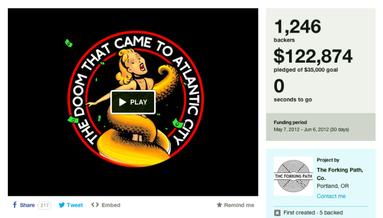 One of the creators, Keith Baker weighed in on the issue on his own blog. He had found out about the cancellation from the Kickstarter update. He had no idea how it had failed; the game had been finished and ready to go since 2011. All Forking Path had to do was produce it, which Chevalier claimed was in progress. Baker reported that he and fellow creator Lee Moyer had no idea what the money was spent on, but neither of them had received any money from the Kickstarter. They promised a print and play version of the game for backers. This narrowed the focus of backer ire on Chevalier. They looked into his background and found another company Chevalier had founded with venture capital that had failed with nothing to show for it. Chevalier claimed that it was a completely different situation, but that did nothing to quell the flames of backers screaming fraud. There were backer tiers up to and including $2,500, so there was an anger over more than just "I didn't get my game". People felt their money had been used to fund Chevalier's life and they were lied to the entire time. There was only one final update to the Kickstarter campaign on July 31st, 2013. Chevalier said that he had refunded the single top tier $2,500 backer his money. He briefly defended both his previous company and what he was doing during the campaign time. He indicated he'd post again when he issued refunds to the next tier, and assumedly when he completed his post mortem. There was never another update on the Doom That Came To Atlantic City Kickstarter.  But the story doesn't end there. While all of us backers expected the game to be dead and at best be able to play via print and play, we were surprised. Another publisher was interested in the game: Cryptozoic. In August 2013, all backers received an email from Scott Gaeta, COO of Cryptozoic. They had contacted Lee Moyer and Keith Baker and worked out a publishing deal. Cryptozoic would publish the game, and they would honor the pledges of all backers, giving them copies of Doom for free. Cryptozoic hadn't received any of the Kickstarter money, nor had Moyer or Baker. It would have been a noble gesture just to pickup the game and publish it, but nobody expected that a company that hadn't received backer money would honor someone else's promise and get copies to the backers. Cryptozoic could have easily gotten away without giving backer copies, but they didn't, they went a step farther, and this definitely bought a fair amount of goodwill from the backers. They wouldn't be able to fulfill the other backer rewards, but ultimately the main reason many of us backed was for a copy of the game and the beautiful Paul Komoda sculpts of the elder gods. They made good on that promise. A few weeks ago I received my copy of the Doom That Came to Atlantic City. You can now go to Cryptozoic's site and purchase a copy of your own. 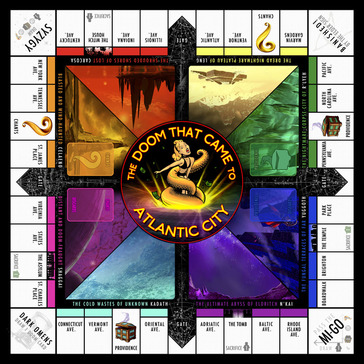 So how does that play? A pretty game with elder gods actually materializing is one thing, but would you actually want to play it? The answer is yes. If you ever felt Monopoly was lacking and wanted to see it mixed with new game mechanics, a little Munchkin, and lots of Lovecraft, this is your game. Lee Moyer seems to have nailed what he was going for when designing the game. If you see the board laid out, the Monopoly parody is obvious. There's popular Atlantic City properties and corner spaces. There are spots where you draw cards. But there are other differences. Instead of go, there's Mi-Go. Instead of Jail, you are banished. Chance cards are now Chants. Community Chest is now Providence. Railroads are now neutral gates. And the properties are gates. In a reversal of Monopoly expectations, the gates start with houses and it is the job of players to destroy them to capture the gate. In the final phase of a player's turn, they make an attempt to destroy a house. Destroy the last house (out of two in the standard game) on a gate and you now own that property, able to charge a toll to players that land on it and garnering a few other abilities. Capture six gates and you win. But that's not the only way to win. There are also Doom cards. Each Doom card has an individual win condition. Each player receives a Doom card at the start of the game and landing on a certain spot on the board lets you swap them. Once you have achieved the prerequisite on the Doom card, if you end your turn on your own gate, you can attempt to fulfill the condition, either a flat fee in cultists or destroyed houses, or a set of die rolls. 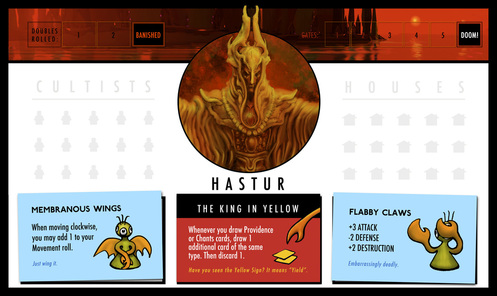 Of course, unlike normal Monopoly, there's a fair amount more dickery that can be done to your fellow players to keep them from winning. There are two other types of cards, Providence and Chants. The Chant cards are new abilities which you apply to your own elder god and are permanent until swapped out. Some are a permanent plus to movement or destruction, others allow you to do things like move in nonstandard ways or draw different cards. Providence cards are wild cards. Each has a cost in cultists or destroyed houses, but they can be played at any time. They can change your opponent's die rolls, move them, cause them to lose something, or end their turn prematurely. When one player is on the verge of victory, they will suddenly find their plan disrupted in many ways by vicious Providence cards their opponents have been holding onto for just that occasion. This just scratches the surface of what's in the game. You can also attack nearby players. Rolling doubles gives you extra turns/phases, but too many doubles in a turn banishes you, putting you in the game's version of jail. Starting a turn at any owned gate allows you to start your turn from any gate owned by the same player. Then there are optional rules with optional cards included, such as Tomes and Resorts. The miniatures for the game, designed by Paul Komoda, and amazing. Two and a half inches tall and sculpted in plastic, they are as worth of awe as anything else in the game. I know I will definitely be looking to use these minis in other games, such as Arkham Horror, just because I can. Lest you think this game is an all-too-serious theme of doom and gloom, fear not. The cards in the game are written in a humorous style by Keith Baker, creator of Gloom. The card humor helps to highlight that for all the elder gods and house destruction, the game is lighthearted satire. 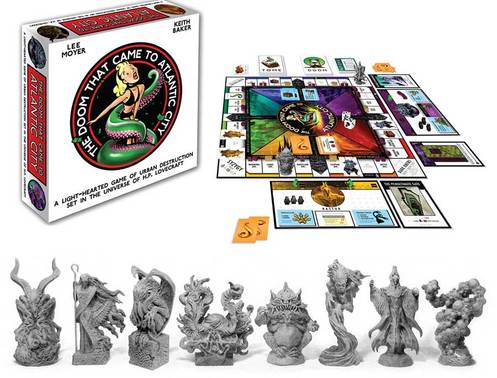 And that's really what The Doom That Came To Atlantic City is, beyond everything else. It's a fun romp over a monopoly board. It has some interesting rules, but it isn't a super complicated game like Arkham Horror, a wargame, or Agricola. It's a dice rolling, space counting, screwing over friend game that's light, breezy, and probably particularly fun over a few beers. Criticisms? The rules only list it as for 2-4 players. I'm not sure why it caps at 4, as there are more than 4 elder gods. Is it component scarcity? Is the game too crazy with more? Has it only been balanced for 4? No idea. My other criticism is the rules booklet. It's a very basic printing. It's not bad, but it's rather lackluster compared to the board, the minis, and cards. The Doom That Came to Atlantic City has had a very tortuous path to the market. It is the game that almost never happened. And it did only happen due to Cryptozoic stepping in as a knight in shining armor. I'm grateful that they did and I'm glad I got to finally play this game. The Doom That Came to Atlantic City on Amazon The Doom That Came to Atlantic City on Cryptozoic Cryptozoic's Web Page The Doom That Came to Atlantic City on Board Game Geek Keith Baker's blog Lee Moyer's site Paul Komoda's tumblr
0 Comments
Leave a Reply. |
Archives
December 2022
|
 RSS Feed
RSS Feed
